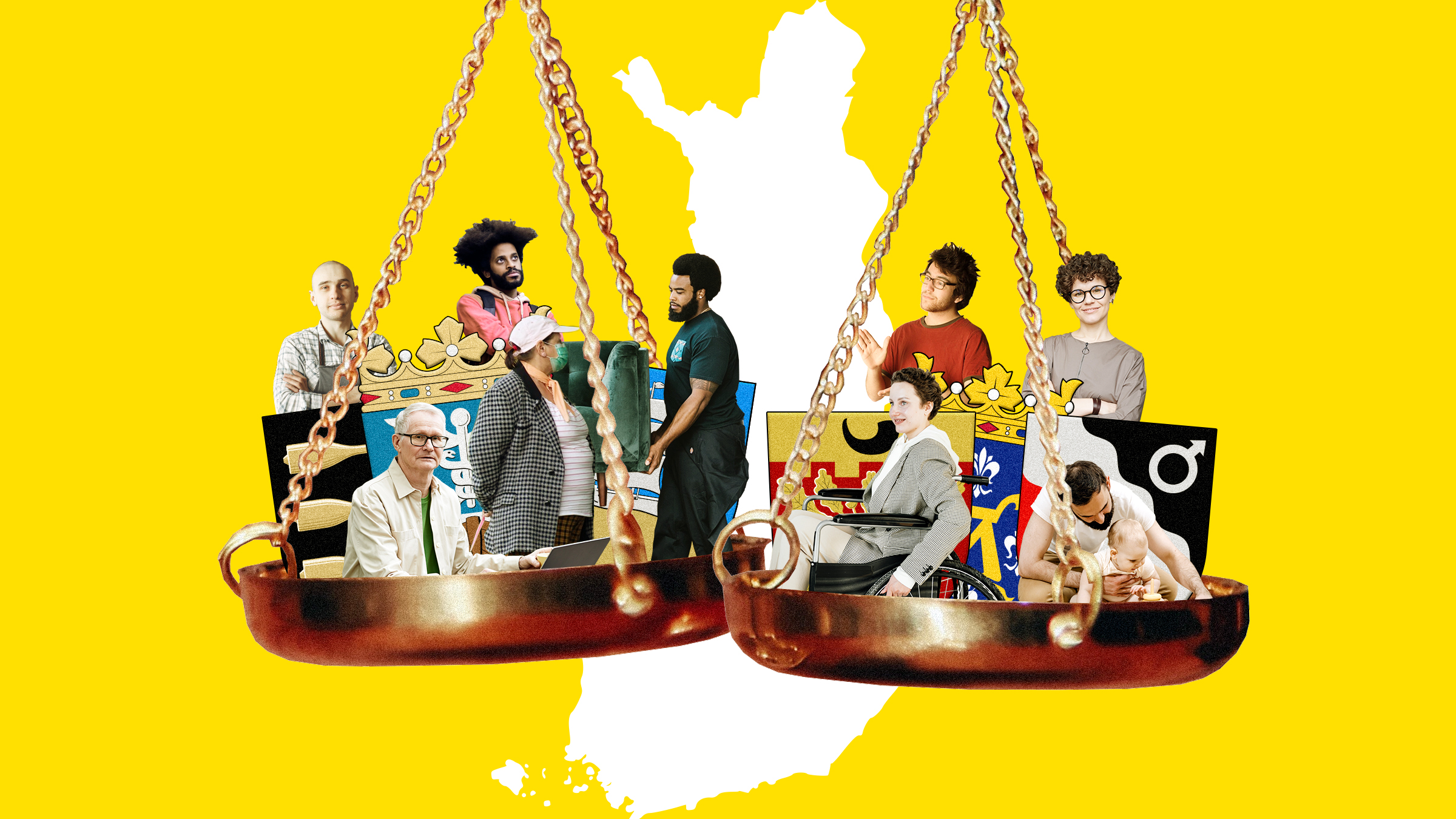A deliberative citizens’ panel is a democracy innovation in which a randomly selected group of people come together to learn about and discuss a societally important issue and to make recommendations on this issue to support decision-making.
Citizens’ panels have been organised on a variety of topics at different levels of decision-making, from the organisation of public services to urban planning, euthanasia, and the mitigation of climate change. In Ireland, for example, a citizens’ panel was even used as part of a constitutional reform.
In Finland, top-level research by international standards has been conducted on deliberative democracy, and the competence related to organising citizens’ panels is strongly concentrated in universities. Therefore, deliberative citizens’ panels have mainly been organised as part of universities’ research projects.
Sitra’s goal is to establish citizens’ panels as a permanent method of participation at all levels of decision-making in Finland. We have surveyed the best examples from around the world, organised online and in-person training, and funded experiments in municipalities, wellbeing services counties, and at the national level. We have also worked to increase the impact of citizens’ panels by integrating them into administrative and decision-making processes and by increasing decision-makers’ understanding of the opportunities provided by deliberative democracy.
In this article, we provide an overview of the citizens’ panel experiments that Sitra has funded in Finland.
Citizens’ panel experiments at the national level
At the national level, citizens’ panels are particularly suitable for discussing a variety of polarising value questions and intergenerational themes. They give decision-makers a deeper understanding of citizens’ thoughts and concerns than opinion polls and surveys. At best, this enhances commitment to decisions and facilitates their implementation.
The Citizens’ Parliament experiment
The Citizens’ Parliament is the largest deliberative citizen deliberation ever organised in Finland. It was aimed at investigating whether deliberative citizens’ panels could support the work of Parliament in discussing citizens’ initiatives. The Citizens’ Parliament was implemented in accordance with the Deliberative Poll model.
In the Citizens’ Parliament, more than 600 Finns had the opportunity to listen to experts, engage in discussions in small groups, and form their opinions on four citizens’ initiatives. The themes of the initiatives dealt with permitting a drug consumption room trial, legalising cannabis, moderating the fuel tax, and lifting the excise duty on diesel.
During the experiment, the participants’ knowledge about the relevant themes increased significantly, and their opinions changed as a result of the discussions. The results of the Citizens’ Parliament are available in more detail in the summary report (in Finnish). The parliamentary committees handling citizens’ initiatives have been informed about the results.
Invitations to the Citizens’ Parliament were sent to more than 30,000 randomly selected Finnish people. More than 2,300 people volunteered, and almost 700 of them were selected to the experiment. The participants were selected according to their age, educational level, gender, native language, and municipality of residence to represent Finland in miniature.
The Citizens’ Parliament experiment was organised in November 2023 in cooperation between researchers from Åbo Akademi, Tampere and Stanford Universities, the Parliament of Finland, and Sitra.
Coming up: Citizens’ panel deliberating over the future of forest use
Citizens have very little say in the public debate and decision-making on forest use. To help respond to this challenge, Sitra, the Finnish Environment Institute (Syke) and the Natural Resources Institute Finland (Luke) will join forces to organise a citizens’ panel on forests (link in Finnish).
The panellists familiarise themselves with objective research data, hear experts and engage in constructive discussions while listening to different views. The panel will provide decision-makers with recommendations on what kind of forest use citizens would find fair and acceptable in order to achieve the established nature and climate goals. The opinion will be handed over to decision-makers as part of the project The future of forest use and required steering methods (link in Finnish) in November 2024.
The invitation to the citizens’ forest panel were sent to 7,000 randomly selected Finns. The volunteers were formed into a diverse citizens’ forest panel representing different population groups. The panel will convene online in August and September 2024.
Residents’ panel experiments in wellbeing services counties
Deliberative democracy will be tested in the form of residents’ panels in four wellbeing services counties. Sitra’s aim is to make resident participation an integral part of decision-making in wellbeing services counties from the very beginning.
Residents’ panel experiment in the wellbeing services county of Central Uusimaa
The wellbeing services county of Central Uusimaa has increased the participation of its residents with two residents’ panels, one in autumn 2023 and the other in the spring of 2024. In the first one, the participants deliberated how the wellbeing services county can support and reinforce the mental well-being of children and young people. In the other panel, the participants discussed what kind of digital solutions the wellbeing services county of Central Uusimaa should offer. The panels’ concrete action recommendations will be handed over to county council and their implementation will be monitored.
Invitations to the residents’ panels were sent to 5,000 randomly selected people living in the wellbeing services county of Central Uusimaa. Approximately 250 volunteers replied, and 50 of them were randomly selected to represent the population of the wellbeing services county as well as possible. A proportionally larger number of young people were selected to the first panel because the theme of the panel focused on children and young people. Approximately one third of the participants of the first panel also participated in the second panel, providing the panel work with continuity.
Residents’ panel experiment in the wellbeing services county of Lapland
The wellbeing services county of Lapland has organised two residents’ panels, one in autumn 2023 and the other in spring 2024, to make older people heard better in decision-making. An invitation to the panel was sent to 3,000 people aged over 65, and 150 of them reported they were interested in participating. Fifty people were selected to the experiment, and 45 of them were finally able to participate in the panel work. The participants were randomly selected and, except for one municipality, all municipalities in the wellbeing services county were represented in the panel.
The topics of the residents’ panels in Lapland dealt with the development of services for older people from different points of view. The first panel formulated recommendations on the preconditions for safe everyday life and living at home. The second panel took a stand on what kind of digital support older people need for using remote health care and social welfare services. The panel’s recommendations (in Finnish) are taken into account in the work of the county executive of Lapland and the committee on inclusion and customer relationships.
Because of the long distances in Lapland, organising citizens’ panels requires cost-effective solutions. Therefore, the first panel was implemented partly and the second one fully digitally. In the first panel, the participants convened locally in four municipalities but worked together online. The second panel was organised fully online using a variety of tools: the discussion was held through Teams and orientation and commenting took place in Howspace.
Residents’ panel experiment in the wellbeing services county of Pirkanmaa
The wellbeing services county of Pirkanmaa organised a residents’ panel (link in Finnish) consisting of face-to-face and remote meetings in spring 2024. An invitation was sent to 8,000 people living in Pirkanmaa, of whom 263 reported their interest. Finally, 43 residents from the wellbeing services county were randomly selected to the actual panel.
The residents’ panel convened on three days and was tasked with discussing how the use of digital services can be increased in the wellbeing services county in a respectful and responsible way from the residents’ point of view. This issue was associated with the wellbeing services county’s digital strategy, which is aimed at implementing a significant increase in digital services. The residents’ panel was tasked with producing views and recommendations on how digital services can be promoted in a customer-oriented manner, so that there will be sufficient healthcare and social welfare services and local services available to everyone even in the future.
The final recommendation (in Finnish) of the panel includes eight sections that were discussed in small groups between all panellists. The panellists approved the recommendation almost unanimously. The recommendations given by the residents’ panel are aimed at influencing the wellbeing services county’s digital strategy. The wellbeing services county’s future and strategy committee has already discussed the recommendation. Next, it will be discussed by the division for customer relationships and quality and the county council. The statement drawn up by the residents’ panel will be taken into account in the development of the services of the wellbeing services county of Pirkanmaa and in the county’s decision-making.
Residents’ panel experiment in the wellbeing services county of Central Finland
The wellbeing services county of Central Finland organised a deliberative residents’ panel (in Finnish) in spring 2024. The panel supported the development work of the service network by deliberating over the question: “How can we secure cost-effective, equitable and people-oriented services to everyone living in Central Finland now and in the future?”
An invitation to the residents’ panel was sent to 10,000 randomly selected adults living in Central Finland. In the invitation letter, the recipients were invited to express their views on the development of the service network by using the electronic Polis platform, and they were asked to become members of the residents’ panel. From the 190 volunteers who responded to the invitation, 35 persons were randomly selected to represent the population of the wellbeing services county as well as possible.
The residents’ panel worked with an intense timetable, and all the three meetings of the panel (12 hours altogether) were organised during the same week in March 2024. The panel’s work resulted in a statement (in Finnish) including views and recommendations pertaining to the cost-effectiveness of the wellbeing services county’s operation, the provision and organisation of services in the county, the values and attitudes guiding the operation, and the personnel.
The statement was handed over to the county council and those preparing the service network. It was also published on the wellbeing services county’s website. The county council is due to make a decision on the service network in May/June 2024.
Citizens’ panels in the planning of municipal finances
The municipal finances sector is facing a significant transition (link in Finnish, abstract in English) for reasons such as demographic change, development of the economic structure, and the establishment of the wellbeing services counties. With sufficient will, this disruption is also an opportunity for municipalities. Municipalities can specialise based on their strengths, build new partnerships and renew their ways of working.
Citizens’ panels are particularly well suited to financial planning, thanks to the orientation stage that is part of the panel method. The residents can familiarise themselves with the objectives of the municipality’s actions, evaluate their implementation, and analyse the different possible solutions. In addition, decision-makers will have something to rely on to make wise choices.
Sitra helps its partner municipalities experiment with new ways for residents to help in financial planning.
Pilot experiments of citizens’ panels in Pieksämäki and Merikarvia
In 2023, citizens’ panels assembled of the residents of Pieksämäki and Merikarvia familiarised themselves with the finances of their municipality and were given the task of analysing the overall financial status of the municipality. The panels submitted proposals within the respective budget frameworks, and the proposals were published and handed over to decision-makers.
In Pieksämäki, a town of approximately 17,000 inhabitants, the invitation to join the residents’ panel was sent to one thousand randomly selected residents. Of them, 70 reported their willingness to participate in the panel. From those who volunteered, twenty persons were randomly picked to participate, and ultimately the panel consisted of 17 persons. The reference was Merikarvia, a municipality of 3,000 inhabitants, where the panel was assembled through an open invitation. All the 14 people who expressed their willingness to participate were selected to the panel.
Further citizens’ panel experiments in Turku, Jyväskylä, Salo and Rautalampi
Further experiments in 2024 involve four municipalities in which a randomly sampled citizens’ panel takes a stand on a key issue identified in the municipal finances and gives recommendations at the different stages of the budget process.
In Turku, the citizens’ panel looks at balancing (link in Finnish) the finances in a phenomenon-based manner from the point of view of children and young people. The panel gives its recommendations on the financial and operational plans for the year 2025 already at the preparation stage to different committees and to the City Council.
In Jyväskylä, the citizens’ panel analyses the impacts of the financial balancing programme on residents’ daily life and how it affects different population groups. The panel issued recommendations on correcting the focus of the budget.
In Salo (link in Finnish), the citizens’ panel familiarises itself with the assessment (link in Finnish) of the city’s operation and finances and with its investment needs. The panel gives its recommendations for this year’s evaluation report (link in Finnish), the next budget, and the investment plan for the period 2026–2029.
In Rautalampi (link in Finnish), the citizens’ panel examines the situation of the municipally owned rental housing company and the role of housing supply in the municipal economy. The panel makes recommendations for the development of rental housing to the municipal government.
These experiments will provide experience of how citizen participation helps financial planning in municipalities of different sizes and in different situations. At the same time, the aim is to find approaches that can be established as part of the financial planning of all municipalities.
Making citizens’ panels a permanent form of participation in Finland
High-quality implementation of a citizen’s panel takes time. The time reserved from the planning of the panel until its implementation should be at minimum two to three months. A good rule of thumb is that quality trumps speed. Therefore, it is important that the problems given for citizens’ panels to solve are selected carefully with enough time reserved for choosing the topic. A citizens’ panel should not be organised if there is no intention to use the results in decision-making.
We believe that when linked to the decision-making process directly, citizens’ panels may improve both the quality and effectiveness of participation. We collect information systematically on the experiments implemented in 2023 and 2024 to gain a better understanding of the topics for which citizens’ panels are bested suited at the municipal and regional level and how they can be implemented as cost-effectively as possible without compromising their quality. We intend to publish our results more extensively during 2025.



